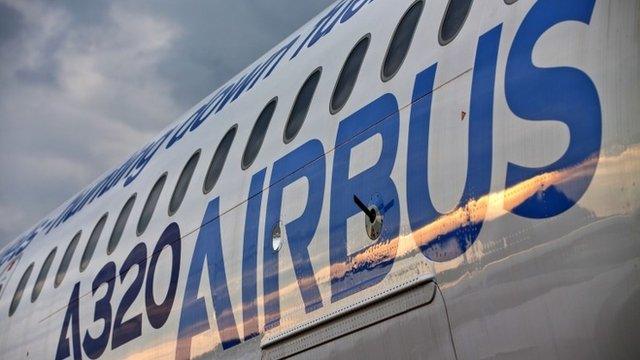Germanwings plane 4U 9525 crashes in French Alps - no survivors
- Published
Aerial footage showed the site of the crash in the Alps - courtesy BFM TV
A Germanwings plane carrying 150 people has crashed in the French Alps on its way from Barcelona to Duesseldorf.
The Airbus A320 - flight 4U 9525 - went down between Digne and Barcelonnette. There are no survivors, officials say.
The "black box" flight recorder has been found, France's interior minister says. The cause of the crash is not known and the plane sent no distress signal during an eight-minute descent.
Among the passengers were 16 German pupils returning from an exchange trip.
Germanwings, a low-cost airline owned by Germany's main carrier Lufthansa, has an excellent safety record. French, Spanish and German leaders have expressed shock.
A recovery team reached the site, in a remote mountain ravine, earlier on Tuesday. Their work was called off in the evening and will resume at first light on Wednesday, the French interior ministry said.
Bruce Robin, a prosecutor from Marseille, told the Reuters news agency that he had seen the wreckage of the aircraft from a helicopter.
"The body of the plane is in a state of destruction, there is not one intact piece of wing or fuselage," he said.

Key points
Weather reportedly good when A320 Airbus came down
Plane descended rapidly but sent out no distress signal
White House says no suspicion of terrorism

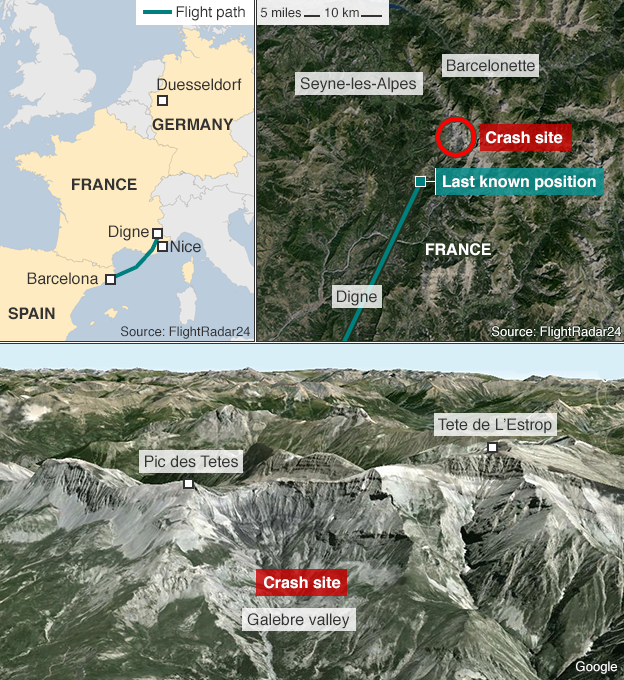
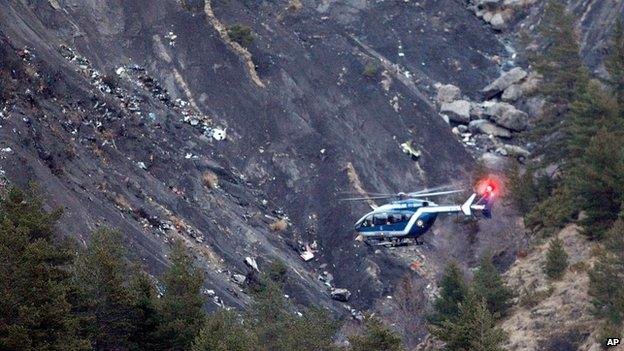
Helicopters ferried recovery teams to a crash site marked by smouldering debris
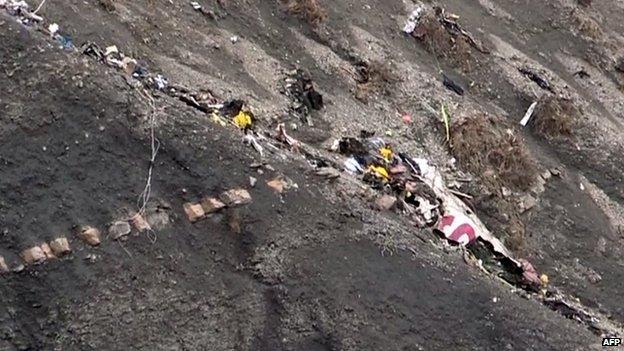
Sections of the aircraft could be identified amid the wreckage strewn down the mountainside
German Foreign Minister Frank-Walter Steinmeier was also flown over the crash site and described it as "a picture of horror", the Associated Press news agency says.
Officials believe 67 of those aboard the plane were German citizens. Forty-five of the passengers had Spanish names, Spain's deputy prime minister said.
The passengers included a German school class on its way back from an exchange trip as well as two opera singers, Maria Radner and Oleg Bryjak.
Ms Radner was travelling with her husband and baby.
The flight was also carrying citizens of Australia, Turkey, Denmark, the Netherlands and Belgium. UK Foreign Secretary Philip Hammond said it was "sadly likely" that some British nationals were on board.

The relatives of passengers aboard the flight received a police escort at Barcelona airport

News of the crash was also greeted with shock at Duesseldorf airport
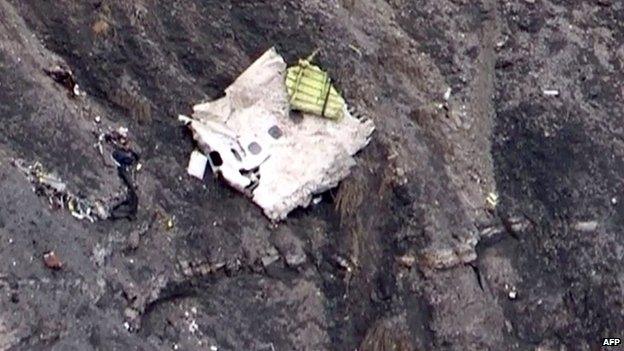
Only small sections of the aircraft survived the impact
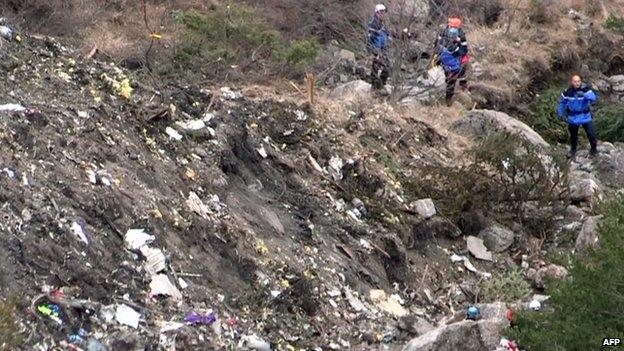
Recovery workers will return to the site on Wednesday morning
Sandrine Boisse, a tourism official from the ski resort of Pra Loup, told the BBC that she believed she had heard a strange noise in the mountains at around 11:00 (10:00 GMT).
"At first we thought it was on the ski slopes, an avalanche, but it wasn't the same noise," she said.

Analysis: Richard Westcott, BBC Transport correspondent
We know the aircraft went from a normal cruising height of 38,000 feet to crashing in the mountains in just eight minutes. One pilot told me that is twice the normal descent rate, but he also said that the aircraft is capable of coming down even more quickly and still being okay.
In an emergency, the pilots' first priority is to fly the plane, but as soon as they have some control they are trained to make an emergency call. That didn't appear to happen in this case, which suggests the pilots were coping with something so catastrophic they never had time to radio in a mayday, or turn to find the nearest runway.
It's still too early to know anything for certain, but that might point to both engines failing, a fuel problem or something critical breaking off the aircraft.

Haltern mayor, Bodo Klimpel: 'Sixteen students... were due to fly home this morning'
Thomas Winklemann, Germanwings: "Descent lasted eight minutes"
Angela Merkel: "This is a time and an hour of great sorrow and grief"
The plane began descending one minute after it reached its cruising height and continued to lose altitude for eight minutes, Germanwings managing director Thomas Winkelmann told reporters.
He said the aircraft lost contact with French air traffic controllers at 10:53 (09:53 GMT) at an altitude of about 6,000 feet.
The plane did not send out a distress signal, officials said. Earlier reports of a distress call, quoting the French interior ministry, referred to a message from controllers on the ground.
The White House has said there is no evidence so far of a terror attack. A Lufthansa official said they were assuming for the time being that the crash had been caused by an accident.
The Airbus A320 is a single-aisle passenger jet popular for short- and medium-haul flights.
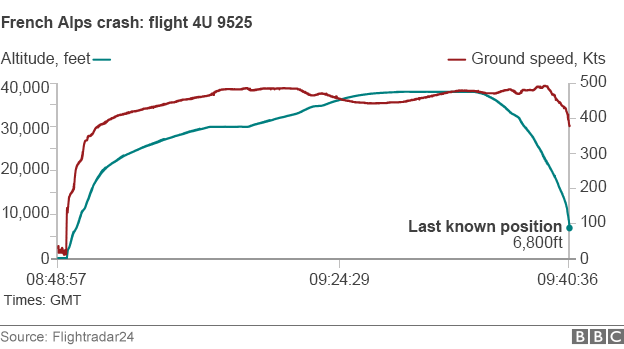
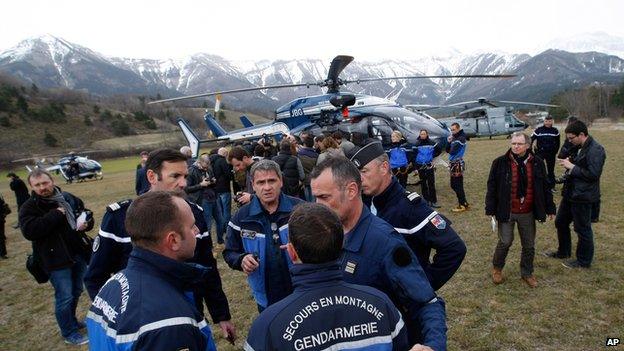
Rescue workers and gendarmes assembled at an airfield near the crash site
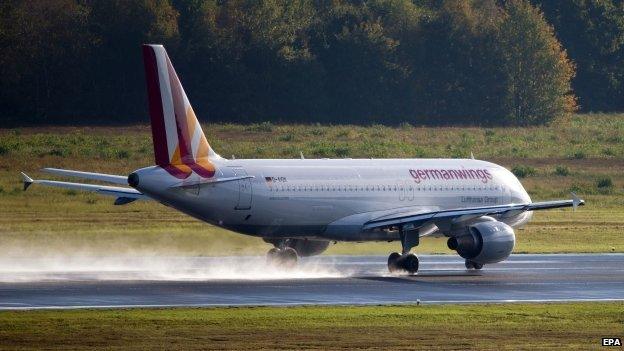
The Germanwings airliner, similar to this one, had been flying to Duesseldorf in Germany
- Published25 March 2015
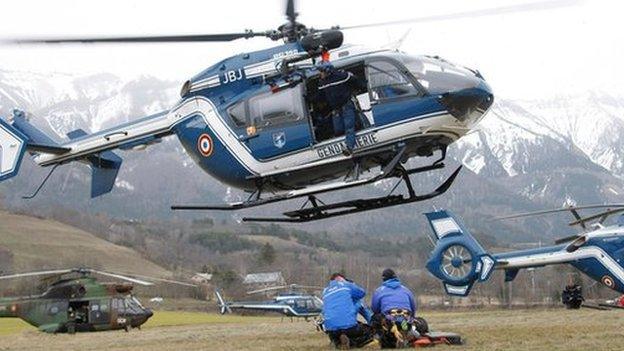
- Published24 March 2015
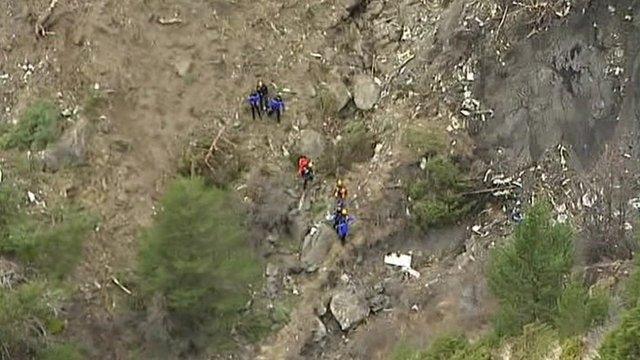
- Published24 March 2015
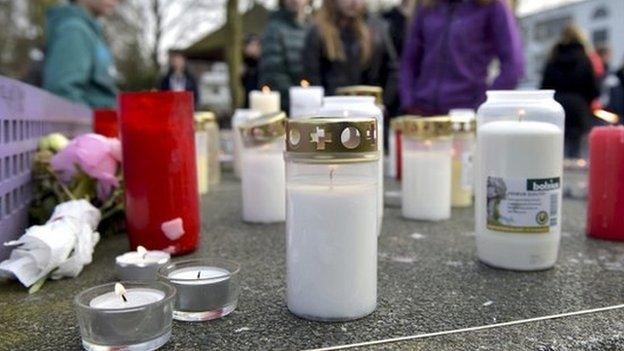
- Published24 March 2015
